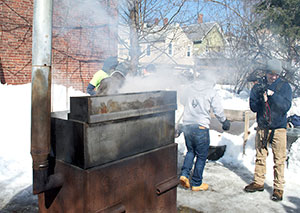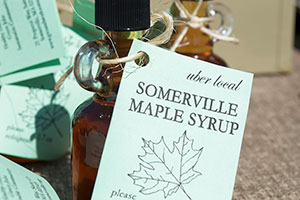
Volunteers come out to help boil down the sweet maple tree sap, while others come to sample the resulting syrup. — Photos By Douglas Yu
By Douglas Yu
Few people equate good quality syrup with Somerville. But when the Maple Syrup Boil Down Festival was first held in the city 16 years ago, many locals instantly pushed their Somervillian pride a bit further.
The annual festival, organized by Groundwork Somerville, took place on Saturday at the Somerville Community Growing Center, situated in a quarter of a gently sloped hillside near Union Square. After a series of record winter storms, this community green space was blanketed with a thick layer of snow. However, it didn’t stop people from all across the city from tasting a hot sample of the freshly tapped tree sap.
Stephen Pichardo, who volunteered for the festival, helped set up the syrup boiler at the event. “We show people the process of how maple syrup is made. The process is kind of hard, because it takes about 40 gallons of sap to make one gallon of syrup,” he said.

A jug of some of Somerville’s finest.
For many local residents, it was their first time to witness a syrup boiler in person, and many of them were amazed at how much sap needs to evaporate in order to distill the final product.
Standing right next to Pichardo was an old-fashioned rusty boiler with labels affixed to it, the words barely recognizable. Chris Mancini, Executive Director of Groundwork Somerville, said the machine had been used for 10 years.
“Inside the boiler, it’s firewood burning to heat the whole thing up,” Pichardo said, explaining the functionality of the boil machine that’s about the size of two washing machines. “All you put on top is just the sap. And the sap is 98 percent water, and all the water will eventually end up evaporating out,” he said.
After the water in the sap is dried out, the syrup will automatically come out of a faucet attached to the boiler. “It’ll immediately taste sweet,” Pichardo said.
Somerville doesn’t have a local syrup manufacturing company. However, at the festival several types of syrup were displayed from Vermont, including Vermont Fancy that was made in 1999 and “A” Dark Amber, made in 1999 as well, to compare with Somerville’s counterpart.
“Somerville’s syrup has a great balance. It doesn’t taste too heavy or too light,” one resident said at the festival.
The local flavor of boiled syrup was not the only thing for people to taste at the event. Children and adults also welcomed the unboiled, freshly milked tree sap, which filled half of a bucket.
“The reason why there’s not a whole lot right now is because the sap that flows in the trees depends upon the temperatures that are above and below freezing,” Nick Pittman, a volunteer from Groundwork Somerville, explained, while handing out samples of sap to the public. Because of the recent cold weather, the sap mostly sits in the bottom of trees. That makes it hard to drill the sap out of the trees.
The movement of tree sap is seasonal. When the temperature is warm enough, especially during the spring, the trees will transport sap from the roots toward the leaves in order to provide enough nutrition for plants to grow.
An explanatory graphic at the event showed that most trees have four layers before reaching the heartwood, which is the spine of the plants. From the outermost part toward the innermost, there is bark, phloem, cambium and xylem. Xylem is the part of the tree that transports tree sap.
“Every tree has sap in it, but certain trees like the maple have higher percentage of syrup in their sap,” Pichardo said. “Maples are very easy to find here.”
The Maple Syrup Boil Down Festival started in 2000, and Mancini took over the festival in 2005. “People think of making syrup in Canada and New Hampshire, but you can do this in the densest city in New England,” he said.
Groundwork’s environmental youth employment program, the Green Team, helped drill the maple trees at the Tufts campus. During the festival, they were standing at the entrance of the Community Growing Center, selling Somerville syrup and pancakes to the residents.
“It’s a fun event. People get to see the food cycle from the harvest to the product,” Mancini said.
Alice Liou, a Somerville resident, made her first visit to the syrup making festival. When she tasted a slice of pancake after dipping it into a cup of local syrup, she only had good things to say about the event.
“The syrup is sweet and the pancakes are good. I can taste the sap over there. And that’s directly from the trees at Tufts. It’s cool to taste the difference between that and the end product,” Liou said, adding that events like the Maple Syrup Boil Down Festival makes Somerville residents come together and socialize.












Reader Comments